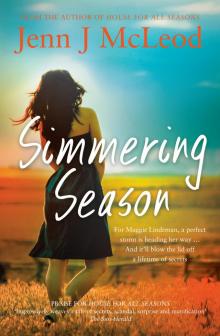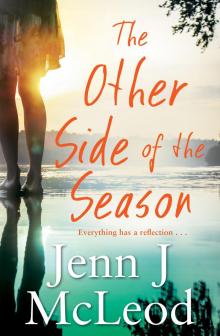- Home
- Jenn J. McLeod
A Place to Remember Page 17
A Place to Remember Read online
Page 17
Gone was the wonky screen door that had snapped shut in Ava’s face the day Marjorie Tate had banished her from Ivy-May for the first time. In its place were the three sets of bi-fold doors, the panes bordered by stained glass in blues and mauves, which John was now opening. Someone had invested a lot of time and money to turn the once functional kitchen annexe into a light-filled conservatory with cream damask curtaining. It was the sort of décor one might drool over in Country Style magazine. Before any photo could be taken, though, someone needed to de-clutter the sideboard, smooth the doily at the centre of the table and replace the dead flowers with fresh. Then there were the dishes piled on the draining board in the kitchen.
‘Decorating is one of my wife’s many talents,’ John confirmed. ‘She had big plans for Ivy-May until I had to go and ruin things.’ As if reading her mind, he whipped away the dead flowers with the doily and went to the kitchen, leaving a shower of shrivelled petals in his wake. ‘At least the fumes won’t be so strong in this room.’
‘The smell of paint doesn’t bother you?’ Ava called in disbelief. Here was John – her John – making small-talk about paint fumes.
‘Not smelling paint would bother me more. I’m happiest with a brush in my hand. Would you like to take a seat? I’ll only be a minute or two and we can get started.’
Marjorie Tate had used the same words that first day, after showing Ava into the drab kitchen annexe.
Within moments John was back and dropped an armful of art equipment on the dining table where Ava sat. She’d been so lost in her thoughts and in a family of magpies on the railing outside that she hadn’t heard him return.
‘Now, what was I telling you about preparing for the portrait? I think I briefly mentioned yesterday… ’
Ava only half listened when John began repeating the same advice as the Internet article had offered, even confirming that yesterday’s mandarin collar would have been all wrong.
‘People sitting for portraits also generally choose to add a different dimension to the work,’ he explained. ‘A family heirloom, a brooch, a ring, a pendant, that sort of thing. Detail matters. It was Picasso who once asked, “Are we to paint what’s on the face, what’s inside the face, or what’s behind it?” Dalí claimed an artist does not paint a portrait to look like the subject at all. Rather, the person grows to look like his portrait. I tend to agree.’
‘Salvador Dalí? Gracious!’ Ava’s knowledge of his work was limited to bizarre but intricate optical illusions. Her own face must have shown dismay because John laughed – and what a beautiful sound that was.
‘What I mean is, I’m no Dalí, but you could say detail is one of my strengths.’
Detail, of course! Ava’s focus had been only on her purpose: getting to know John over the period of the sitting so she could paint her own image of the man’s life. In reality, he would be scrutinising every facet of her.
More self-conscious about her appearance than ever, she questioned the logic that had put her back at Ivy-May at this time in her life. To paint her, John’s artist’s eye would dissect her and break her down into individual parts, staring forensically at the texture of her face before brushes on canvas put her back together. He’d tried to warn her yesterday, but she hadn’t been interested in listening to such unfavourable prattle about the portrait process or her poor choice of neckline. If he wanted detail, she’d give him detail in the form of the dragonfly brooch made from three blue opals for its body and the finest silver filigree for the four overlapping wings. The other thing she’d need to set the scene for today’s sitting she had carted in the tote bag currently hooked on the back of her chair.
When John picked up a camera and fiddled with the lens, Ava slipped inside herself, like a snail disappears into its shell the moment it senses danger. A flash went off in her head, a small explosion but enough to blast open the door to a memory she’d locked away, the words a distant echo. For Christmas that year, John’s parents had presented their son with a camera. He’d wanted one for ages, something to do with identifying and recording cattle, but he’d found other uses for it. Not that his parents knew, of course.
*
‘Give me a proper smile,’ John had said that first time. Ava had been standing at the kitchen bench when she’d struck a pose while her hands rubbed flour and butter together. ‘But no funny faces.’
‘Not even a blowfish?’ Ava loved puffing out her cheeks and pinching her lips tight as she gulped for air.
‘Do you know how much money a roll of this film costs to get developed? Mr Jergens already gives me a weird look every time I walk in. Reckon he reports back to Mum how much I spend. Probably has a good snoop at my pictures when they come into the shop.’
‘I’m sure you’d know about it if he did.’
‘Not that I’d blame him.’ He sidled up to Ava and wrapped his arms around her from behind.
‘Stop it! Your parents could walk in any time.’
‘They’ll find out sooner or later.’
She swivelled in the circle of his arms to face him. ‘Find out what?’
‘That I’m all grown-up and can date whoever I like.’
‘I’m the grown-up, John. You’re not yet twenty-one. And we’re not dating.’ Ava nudged him out of the way, then started kneading the dough.
‘What are we, then?’
‘You know what your folks expect.’
‘Yeah, that I’ll settle down with a nice girl of my choice and grow the business.’ He kicked the refrigerator door closed and took a bite of the green apple.
‘They expect that nice girl to be Katie.’ Ava shook her head when he offered her a bite of apple. ‘Put that down and help me with these scones.’
John Tate had become Ava’s forbidden fruit. As much as she enjoyed the charged glances, the concealed caresses, the thrill of an affair, the man pointing a camera at her again was her employer’s son.
‘John. You’re sweet, but—’
‘Don’t start with the too-young thing, Ava. Why can’t I fall in love with you?’
‘Just put the camera down and let’s have scones.’
*
‘I beg your pardon?’ The artist’s face was above Ava, close enough for her to see the multi-coloured flecks of paint in the curls he habitually raked with his fingers.
‘What?’ She was staring at the mop of light-brown curls, thinning, greying, and the small section of visible scar on his skull above one ear.
‘You were mumbling. Something about cameras and scones.’
‘Was I?’
‘Sorry, but I wouldn’t even know what goes into making a scone. I think I might’ve once,’ he said, his thoughts clearly somewhere else. ‘Apparently I was quite the cook when I was younger. Topped the class in home sciences according to my report cards.’
‘Well, it so happens I do know about scones and I stopped by that lovely little supermarket in town especially.’
‘Especially for what?’
‘I’m going to make scones to go with our tea.’
‘We’re having tea?’ John asked.
‘And scones. My no-fail recipe is no fuss and quick,’ she said, ignoring the question. ‘Three, two, one.’
‘I’m not following you.’
‘That’s the simplest of scone recipes. Impossible to forget.’ How sad John clearly had. ‘Three cups of self-raising flour, two tablespoons of butter, one cup of milk. From there you can add anything, savoury or sweet. I like apple and date.’
‘Anything with apple is good by me, but, Ava… ?’ The impending question carried shades of warning. ‘There’s no need to bribe me with food. In case I’ve failed to make my decision clear, I’m agreeing to the portrait. In fact, a few photos and we’re done.’ He replaced one big lens with a smaller one.
‘Photos?’ Ava balked. ‘Perhaps you didn’t understand. I’m not after a photographic piece. I want my portrait painted – with paint.’
‘I understand the concept,’ he said, through a crooke
d smile. ‘Photos form part of my preliminary study. They’ll allow me to keep a visual so I can work on some of the finer details without you having to sit endlessly. I use cameras for my landscapes as well. The lens misses nothing and is capable of capturing a moment in time and preserving the detail before it’s lost – a morning mist over the water, a bird in flight, shadows at dusk.’
‘Or when you wait up all night for the sunrise,’ Ava added dreamily, ‘only to have the magnificence last for a few seconds.’
John paused, thoughtful. ‘I’ve seen plenty of sunrises. A grazier’s day tends to start early. Not sure I’ve ever purposely waited up for one. Then again, my memory’s not to be trusted so I might have once.’
Yes, you did, John. We waited together for the moon to rise – the first red moon I’d ever seen – and we followed its journey from our huddled position on the porch of the cottage. We wrapped ourselves in a blanket together and waited for the dawn light.
If only you remembered.
‘I just remembered,’ John announced, while fiddling with the minuscule, impossible-to-open compartment on the camera. ‘I flattened the battery last time.’ Had he been looking at her instead of the camera, he might have seen her disappointment. ‘Now, where did I put the charger?’
‘Look, about the camera.’ The damn camera with the potential to cut the sitting short. Ava had to think quickly. ‘I’d really rather not have my photo taken, no matter how long the painting takes. I’m in no hurry and I’ve been looking forward to sitting quietly and watching you work. I’m thinking the experience will be quite therapeutic. I won’t be a bother, I promise.’ I’m here, John, and I’m not ready to go. I want to be near you, watch you… Please, John, don’t make it harder for me than it already is. ‘I’m here now, and I know I have the easy bit as all I have to do is sit, but…’
‘That’s just the thing.’ John fiddled some more, the compartment door on the camera a challenge for big hands. ‘A sitting is a partnership, of sorts, and sometimes there are things…’ He gestured helplessly.
‘Such as?’
‘Well, the longer a sitter, sits, and the longer the painter, well… ’
‘Paints?’ Ava quizzed. If not for the threat of the process coming to an end before they’d even begun, John’s struggle might have been amusing.
‘The relationship can be problematic at best, potentially disruptive and a distraction if the sitter remains the whole time. So you see—’
‘Distraction?’ The ghost of Marjorie Tate blew through the room and snapped Ava to attention. ‘Someone told me years ago that I was a distraction.’
I was right here, sitting at this table and just desperate to stay.
‘This isn’t personal, Ava, there’s ample research, so I don’t mention potential issues to be rude, more to ensure that you understand the artist stares at the sitter for extended periods and often the sitter returns the stare.’
‘I see, I think.’
‘Apelles, the ancient Greek artist, set the precedent by falling in love with his sitter.’
‘Did he? And this was a problem?’
‘He was painting a portrait of Alexander the Great’s concubine, Campaspe, in the nude.’ John gave up on the uncooperative battery compartment. He placed the camera back in its bag, leaned his thigh against the edge of the table and trapped his fidgeting hands in his jeans pockets. ‘A boyish artist who falls in love with a regal woman while capturing the sitter’s beauty on canvas is a dangerous liaison indeed.’
Ava let him babble on. ‘I never would’ve imagined,’ she said, when he paused.
‘And in the mid-nineteenth century, Dante Gabriel Rossetti began an ill-fated affair with his model, Elizabeth Siddal—’
‘Yes, yes,’ Ava interrupted. ‘And such liaisons have been at the heart of romantic tales that captivate readers by elevating the artist to hero status for faint-hearted heroines. I’m not only well aware of the genre, I’m neither heroine nor femme fatale.’
‘No, no, I wasn’t implying—’
‘As interesting as all this might be,’ frustration edged her voice up a notch, ‘I assume you have a point to make?’
‘Photography.’ He shook the camera to reinforce his point. ‘Its invention means sitters no longer need to be present for the duration, therefore avoiding the complicated psychological engagement between portrait artist and sitter. All that palaver aside, there’s nothing interesting about staring at the back of an easel for hours on end.’
Ava didn’t trust his tone. The last thing she wanted to do now she was here was leave, or provide him with a reason to send her packing.
‘Thanks to digital technology, your sitting today need only be brief and only for the camera, although… Bloody thing!’ He fumbled. ‘Sometimes I long for the old Kodak thumb-wind.’
‘I remember those well and I’m no more enamoured than you of their contemporary counterparts. As I’ve already said, I deplore the idea of having my photo taken.’
‘But with a picture I can take my time getting the colours how I want them. Even then I can’t guarantee I’m not going to wake up the next day and paint over everything. Not sure how many times I started that particular painting.’ He gestured at the large canvas above the sideboard. Its subject was so vivid Ava couldn’t help but blurt, ‘It’s Ivy-May.’
His stare quizzed Ava. Of course he’d wonder why a stranger to town might know the name, especially with the elaborate gates gone. The original entrance had been grand, with Ivy and May wrought in metal by John’s great-grandfather. Only family and probably a few old-timers in town referred to the place by that name now.
‘I would have thought the place barely recognisable, especially given the state of the gardens you had to trek through on your way to the door. I painted that one not long ago from an old photograph – my way of restoring the place to its former glory, which I clearly have not managed to do in reality. I doubt this house will look as loved again.’
‘Why is that?’
‘No motivation on my part, and I can’t be trusted to paint the place one colour,’ he added, with sarcasm. ‘But you can see how an earlier photograph allowed me to recapture the beauty of another era, without the distractions and defects of the present.’
‘Then I’ve come to the right place. Let’s call the portrait a selfie for those of us less tech-savvy. You can photograph me and airbrush away my imperfections. Marvellous!’ Her palms slapped the table. ‘Returning me to another era is exactly what I was hoping would happen.’
‘That’s not at all what I meant. I do paint what I see, but…’ He smiled, his mood shifting, the stiffness in his stance relaxing. ‘Oh, I get it. Your comment just now was meant to tease. Mrs Marchette… Ava… if I haven’t talked you out of sitting for hours on end then perhaps telling you that I was planning on placing you in that seat by the window will.’ He pointed to the wooden carving chair with the high back and armrests.
‘Good heavens! That’ll have me looking like Whistler’s mother. No, no, let’s find something else.’
John’s finger tapped out a beat on the small dimple in his left cheek as he contemplated the chair in question. ‘So, not that one, eh?’ he pondered aloud.
‘Most definitely not.’
Perhaps it was John goading her this time, but being depicted as an old lady sitting in an uncomfortable chair was not what she’d had in mind, and while she wouldn’t admit it, a studio environment was also not where she wanted to be. Ava was back at Ivy-May, and in any season there were numerous places, all beautiful in their own way, all capable of enlivening the senses: cosy nooks, vast paddocks, hidden pockets. Many had concealed her and John from the world. She was longing to revisit them with him. If only she could make it happen.
‘So, if not that seat,’ John said, ‘perhaps something like an armchair, or would a chaise longue be more to your liking?’
At first, Ava thought he was joking. Did he even own a chaise longue? And should she agree to one, might he kneel
before her, touch her, move her arms and position her hands?
‘Something funny?’ John’s lips twisted into a crooked smile.
‘I just imagined myself as Kate Winslet in Titanic.’
‘That would make me Leonardo DiCaprio, wouldn’t it?’ John roared with laughter, as did Ava, and for too few seconds she was happy.
The last thing she really wanted was a portrait of herself, especially if she ended up looking like a pompous public figure. She almost laughed again just thinking about the look on her daughter’s face should she present her with such a gift. The sitting idea was simply a way of allowing a silly woman some time alone with the man she’d loved and lost, and whose expression had shifted to sombre.
‘A spot in the garden might be nice, John,’ Ava dared.
*
‘No. I don’t think so.’ Time to put your foot down, mate! This idea had trouble written all over it. He didn’t want to paint the woman’s portrait but, weirdly, he didn’t want her leaving yet either. See? The delicate painter-sitter balance is already affecting you. ‘Definitely not outdoors.’
‘May I ask why not?’ she asked.
‘Because…’ Bloody persistent woman! ‘… the lighting would be all wrong and totally unreliable. A sitting needs consistency in every aspect.’ Frustration mounting, along with some other emotion he hadn’t yet identified, John paced the room. ‘Again, I must stress that this idea of yours, choosing me as the artist, is a mistake and—’
‘Okay, yes, I understand.’ The woman interrupted a lot. ‘Forgive me, I’m being too fussy and controlling. Two words my daughter uses to describe me all the time. Children!’

 A Place to Remember
A Place to Remember Simmering Season
Simmering Season Season of Shadow and Light
Season of Shadow and Light House for All Seasons
House for All Seasons Other Side of the Season
Other Side of the Season